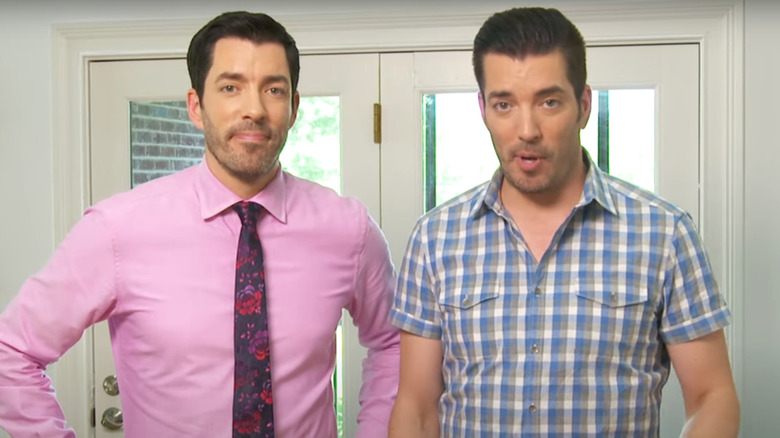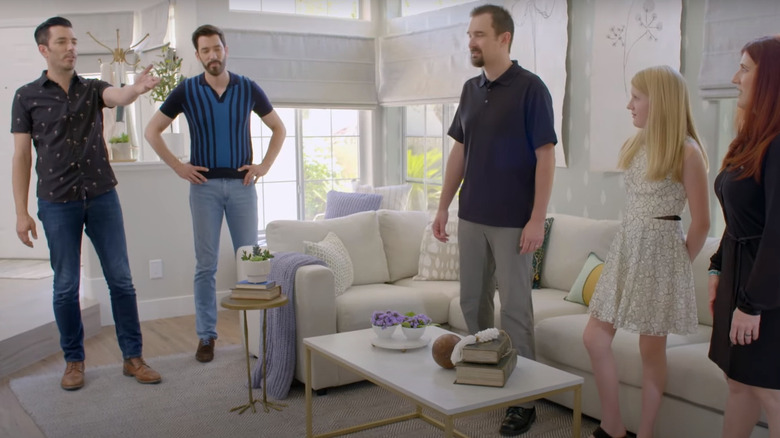The Property Brothers Warn Sellers To Not Make These Renovation Mistakes
The Property Brothers have shared many useful hacks and tips for those tackling a makeover project on their television shows, most notably on "Property Brothers." They also know that when it comes to renovating there are many mistakes that can happen during the process — which can be long and complicated, even for smaller projects — and they speak from experience when it comes to dealing with these remodeling and design fails, as noted by Realtor.
Fortunately, Jonathan and Drew Scott almost always find a way to fix any errors that they encounter in their work. In doing so, they warn other renovators, DIYers, and home viewers to avoid making them. Unfortunately, however, there are some that seem to happen more often than others, even for the most adept among us. Not to worry — the duo always gives out their best advice to make sure this predicament doesn't happen to you.
Don't spend your whole renovation budget in one room
According to ABS-CBN News, Jonathan Scott says it is important to never spend too much of your budget on only one room of your house. "If something happens and you have to sell your home, you would want to still be able to get your money back," he explained. "Be careful not to put in things that other buyers won't pay for." This can be tough to stand by as many have a vision of exactly what they want for a kitchen or bedroom. However, it's a crucial mistake to avoid.
If you're considering selling your home, the Property Brothers suggest instead of going overboard on one specific area, do a simple remodel of the entire residence. "A light makeover on the whole place can make it feel fresh," Jonathan continued. "Otherwise, your buyer walks in and says, 'I love the kitchen but the rest of the house looks terrible.' Then, they're not going to give to you the amount you're asking for."
Speaking of kitchens, Drew Scott suggests having restraint when renovating yours as a good rule of thumb. "The bolder your kitchen, the quicker it will go out of style, bringing down your home's resale value," he advised (via HGTV). He adds that you should be mindful not to crowd the space with too many appliances, and says don't add an island if it won't fit properly.
Don't hire the cheapest contractor
If you're renovating your house, you most likely have a hired contractor to help you complete the job. However, it's imperative that you don't choose someone just because they charge the least. As per HGTV, Jonathan Scott recommends getting written estimates from at least three contractors and comparing them. "The lowest bid never equals the best job," he revealed. "Some give cheap quotes just to get the job, then tack things on or cut corners and install low-quality products." You'll then be left with work that may have to be redone.
These estimates should include details, too. For example, specifics such as the exact flooring, the type of cabinets, permit costs, insurance information, and the labor are just some in the long list of expenses that you should be aware of. If the estimate you are given doesn't include this information, consider finding someone else. Usually, this means that the contractor doesn't have a grasp of the project and could be underestimating it, or has shady practices.
Furthermore, Jonathan says that you spend the money to do things right in general. "For example, we always recommend a bathroom membrane system, which goes under tiles to prevent them from popping and cracking, and keeps water from getting into the substructure," he continued. "I tell clients, 'If you're spending $15,000 on a bathroom, spend an extra $1,000 to guarantee you'll never have a mold problem.'"
Set aside 15% of your budget for for surprise costs
Lastly, Drew Scott tells HGTV it is crucial to budget for your remodel accordingly. See, when you're renovating a home, there may be things that need to be fixed that you don't realize. "Say you're installing a backsplash; you might damage the wall and have to replace some of the drywall," he shared. "Then you see inside the drywall and find electrical issues, and before you know it, you're dealing with more than just a new backsplash." You get the idea.
This is where one of Drew's savvy budget tips comes in handy. "I always tell people to set aside 15% of the total project cost, even more for older homes, for unexpected expenses," he added. In doing so, you will more than likely be able to afford the extra fixes your home will inevitably need — and not be caught off-guard.



